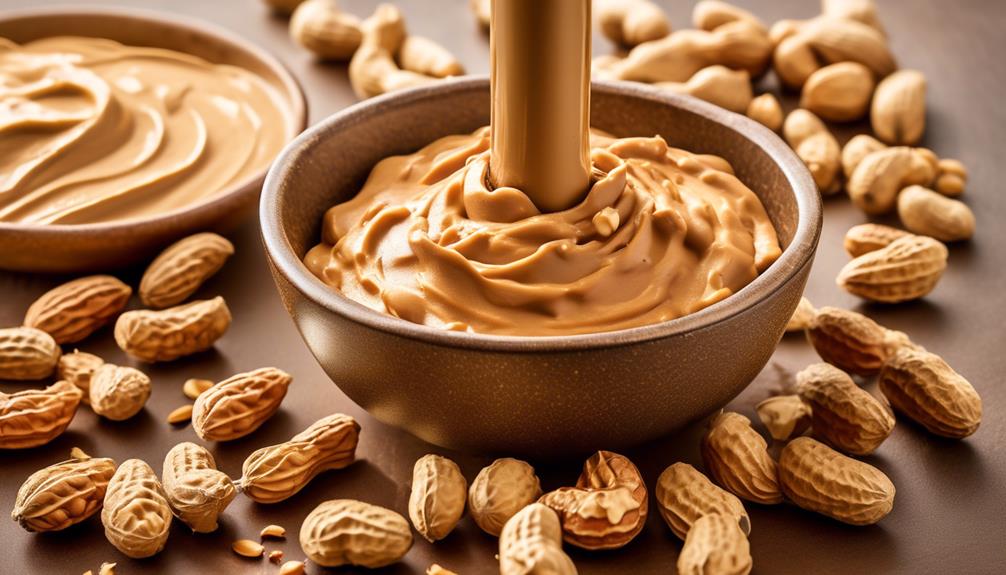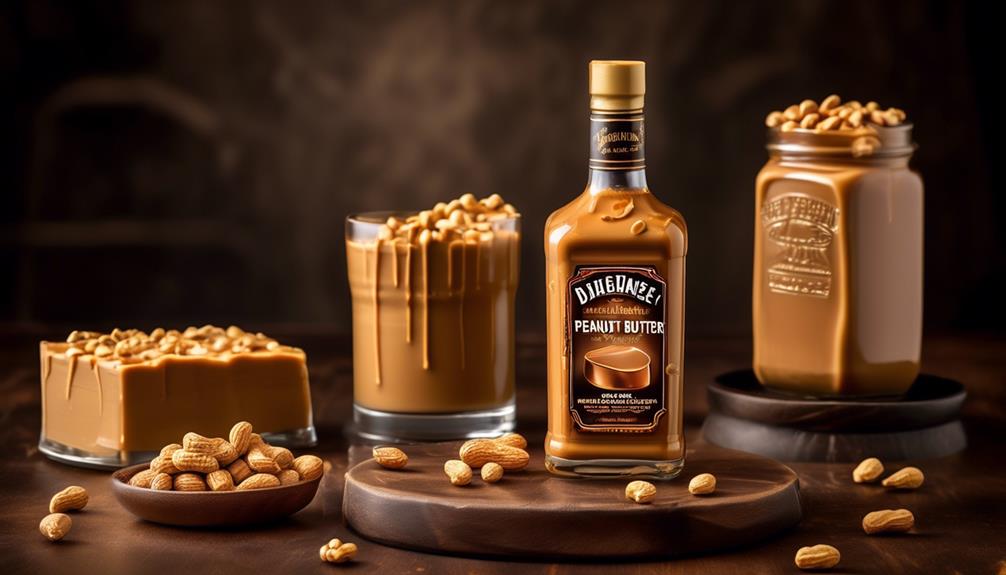Interested in the possible health advantages of peanut butter? Lots of people have been fans of this traditional spread on sandwiches since they were kids, but have you ever thought about what other benefits it might have? Surprisingly, peanut butter offers more than just a tasty flavor.
From its nutrient content to its potential impact on certain health conditions, there's a lot to explore when it comes to the benefits of incorporating peanut butter into our diets. But before we delve into the details, let's take a closer look at what makes this pantry staple a noteworthy addition to our culinary repertoire.
Key Takeaways
- Peanut butter is a rich source of plant-based protein, healthy fats, and essential nutrients like vitamin E, magnesium, and potassium.
- Consumption of peanut butter can support heart health by lowering LDL cholesterol levels and aid in satiety, appetite control, and weight management.
- Individuals with peanut allergies should be cautious of potential risks associated with peanut butter, such as aflatoxin contamination and overconsumption leading to weight gain and obesity.
- Alternatives to peanut butter, such as almond or walnut butter, can be considered for those looking for different options.
Health Benefits of Peanut Butter
Peanut butter offers a range of health benefits, making it a valuable addition to a balanced diet. It's a rich source of plant-based protein, healthy fats, and essential nutrients such as vitamin E, magnesium, and potassium. The monounsaturated and polyunsaturated fats in peanut butter support heart health by helping to lower LDL cholesterol levels, reducing the risk of heart disease.
Additionally, the fiber and protein content in peanut butter can aid in satiety, appetite control, and weight management, making it a healthy choice for those looking to maintain a balanced diet. Furthermore, the antioxidants present in peanut butter protect cells from oxidative stress, potentially benefiting brain health and cognitive function.
Risks Associated With Peanut Butter

After exploring the health benefits of peanut butter, it is important to be aware of the potential risks associated with its consumption, particularly for individuals with specific allergies and concerns about product quality and nutritional content. Peanut butter may pose a risk for individuals with peanut allergies, potentially causing severe allergic reactions. Aflatoxin contamination is a potential risk associated with some peanut butter products, which may have adverse health effects. Overconsumption of peanut butter can lead to weight gain and obesity due to its high calorie and fat content. Commercial peanut butter may contain added sugars and unhealthy fats, posing risks for overall health and wellness. Individuals with peanut allergies should carefully read labels and consider alternative nut butters like almond or walnut butter to avoid potential risks.
| Risks Associated with Peanut Butter | |
|---|---|
| Peanut allergy | Adverse effects |
| Chronic diseases | Blood glucose |
| Add ingredients | Hydrogenated oils |
It is crucial to be mindful of these potential risks and make informed decisions about peanut butter consumption to promote overall health and well-being.
Recommended Types of Peanut Butter

When it comes to peanut butter, we want to make sure we're choosing the best types for our health.
In this section, we'll explore the different types of peanut butter available on the market and their nutritional benefits.
Understanding the usage and pairing of different types of peanut butter can help us make informed choices for our dietary needs.
Types of Peanut Butter
Selecting the right type of peanut butter is essential for reaping the most health benefits and meeting individual dietary preferences.
Natural peanut butter, made with minimal ingredients, is a good source of healthy fats and protein. It offers several health benefits, such as supporting overall health and well-being.
Opting for organic peanut butter can help reduce exposure to harmful chemicals and pesticides. This choice is especially important for individuals who prioritize organic foods and want to minimize their intake of potentially harmful substances.
Low-sodium peanut butter is ideal for individuals looking to manage their sodium intake. By choosing this option, they can help prevent heart disease and type 2 diabetes, both of which can be aggravated by excessive sodium consumption.
Homemade peanut butter allows for control over the ingredients used. This ensures an unprocessed product that supports a healthy immune system. Making peanut butter at home is a great way to avoid additives or preservatives that may be present in store-bought varieties.
Powdered peanut butter is suitable for individuals managing their calorie and fat intake. This type of peanut butter has lower calories and fats compared to traditional peanut butter. It can be a good option for those who are watching their weight or trying to maintain a specific dietary plan.
Each of these types of peanut butter contains monounsaturated fats, which are beneficial for overall health and well-being. These fats can help improve heart health and support a healthy immune system.
Nutritional Benefits
Consider choosing natural or organic peanut butter for its minimal ingredients and avoidance of added sugars and unhealthy fats to maximize its nutritional benefits. When selecting peanut butter, opt for options made from 100% ground peanuts with minimal ingredients, avoiding added oils, sweeteners, or preservatives for a healthier choice. To reduce sodium intake, choose low-sodium or no-salt-added peanut butter. Additionally, peanut powder can be a lower-calorie and lower-fat alternative to traditional peanut butter. To emphasize the importance of nutritional content, here's a comparison of the nutritional value per 2 tablespoon serving of different types of peanut butter:
| Nutrient | Natural/Organic Peanut Butter | Traditional Peanut Butter |
|---|---|---|
| Protein (grams) | 8 | 7 |
| Fiber (grams) | 2 | 2 |
| Sugar (grams) | 1 | 3 |
| Sodium (mg) | 5 | 150 |
| Calories | 180 | 190 |
Choosing the right peanut butter can help lower the risk of heart disease, aid in blood sugar control, and provide essential vitamins and minerals.
Usage and Pairing
For optimal pairing and usage, it's recommended to choose creamy peanut butter for spreading on bread and crunchy peanut butter for adding texture to sandwiches and snacks.
When selecting peanut butter, opt for natural or organic options without added sugars or oils to maximize health benefits.
Pairing peanut butter with whole grain bread, fruits, or vegetables can enhance its nutritional value, aiding in weight loss and improving heart health.
Peanut butter is rich in healthy fats, protein, and essential minerals, promoting healthy hair, a strong immune system, and aiding in the prevention of heart disease and type 2 diabetes.
Additionally, peanut butter can be used as a dip for snacks like apple slices, celery sticks, or whole grain crackers, and can be incorporated into various recipes including smoothies, oatmeal, and savory dishes for added variety and nutritional benefits.
Incorporating More Peanut Butter Into Your Diet

To incorporate more peanut butter into your diet, consider spreading it on whole grain toast or pairing it with an apple for a satisfying and nutritious snack. Here are some practical tips for incorporating this delicious and versatile spread into your daily meals:
- Enhance Your Breakfast: Spread peanut butter on whole grain toast or mix it into your oatmeal for a protein-packed start to your day.
- Snack Smartly: Pair peanut butter with apple slices, celery sticks, or whole grain crackers for a satisfying snack that provides a good balance of healthy fats, protein, and fiber.
- Blend into Smoothies: Add a spoonful of peanut butter to your smoothies for a creamy texture and an extra boost of protein.
- Use as a Dip: Mix peanut butter with Greek yogurt or hummus for a tasty dip that's perfect for pairing with fruits or veggies.
Incorporating peanut butter into your diet not only adds a delicious element to your meals but also provides health benefits such as being a source of healthy fats, vitamin E, and protein. Remember to practice moderation and pair it with nutrient-dense foods for a well-rounded diet that supports heart health and gut health.
The Nutritional Facts of Peanut Butter

Exploring the nutritional facts of peanut butter reveals its abundant protein, fiber, vitamins, and minerals, making it a valuable and nutritious component of a balanced diet.
Peanut butter is a rich source of monounsaturated and polyunsaturated fats, which play a role in reducing the risk of heart disease.
The high protein content in peanut butter supports muscle repair and growth, while the B vitamins contribute to energy production within the body.
Additionally, the fiber in peanut butter aids in digestion and can help maintain healthy cholesterol levels.
The presence of potassium and magnesium in peanut butter further enhances its nutritional profile, promoting good bone health and muscle function.
Choosing natural or organic peanut butter varieties without added sugars or hydrogenated oils is advisable to maximize these health benefits.
Incorporating peanut butter into meals or snacks can be an effective way to increase the intake of these essential nutrients, supporting overall well-being and vitality.
Peanut Butter's Impact on Specific Health Conditions

Peanut butter's nutritional composition, including its high monounsaturated fat content and essential nutrients, lays the groundwork for understanding its impact on specific health conditions, such as heart disease and type 2 diabetes.
- Heart Disease: The high monounsaturated fat content in peanut butter supports heart health by lowering LDL cholesterol levels, reducing the risk of heart disease.
- Weight Management: Peanut butter's fiber and protein content help satiate hunger, making it a valuable ally in weight management. It can help control cravings and promote a feeling of fullness.
- Diabetes: The healthy fats in peanut butter can reduce the risk of developing type 2 diabetes and improve blood sugar levels. Its low carbohydrate content also makes it a suitable choice for diabetic meal plans.
- Overall Health Benefits: Peanut butter contains essential nutrients such as protein, unsaturated fats, magnesium, potassium, and phosphorus that contribute to muscle function, recovery, and overall health, making it a versatile addition to a balanced diet.
These health benefits make peanut butter not only a delicious spread but also a valuable addition to a health-conscious diet.
Creative Ways to Enjoy Peanut Butter

We've uncovered some exciting ways to enjoy peanut butter that go beyond the classic PB&J sandwich. From indulgent peanut butter desserts to creamy and satisfying peanut butter smoothies, there are plenty of creative options to explore.
Whether you're looking for a quick and easy snack or a delicious addition to your meals, peanut butter can be a versatile and nutritious ingredient that adds a flavorful twist to your favorite dishes.
Let's explore some simple yet inventive ways to incorporate peanut butter into our daily diet and elevate our culinary experience.
Peanut Butter Desserts
Indulging in peanut butter desserts provides a delightful way to savor the rich and creamy flavor of this versatile ingredient, offering a myriad of delectable options from cookies and brownies to ice cream and cheesecake.
Peanut butter can be used to make delectable desserts such as peanut butter cookies, brownies, and fudge.
It can be incorporated into ice cream, milkshakes, and smoothies for a rich and creamy flavor.
Peanut butter can be used as a filling for chocolates, truffles, or as a topping for cakes and cupcakes.
It adds a delicious twist to traditional recipes like peanut butter pie, cheesecake, and bread pudding.
Incorporating peanut butter into desserts not only provides indulgent treats but also offers the health benefits of peanuts, including healthy fats, protein, and fiber.
Peanut butter desserts can be a delightful addition to a vegetarian or vegan diet and may contribute to a healthy gut due to its high amounts of beneficial nutrients.
Peanut Butter Smoothies
As we explore creative ways to enjoy peanut butter, incorporating it into smoothies offers a convenient and nutritious way to savor the rich and creamy flavor of this versatile ingredient.
Peanut Butter Smoothies aren't only delicious but also provide a range of health benefits. By adding peanut butter to smoothies, you can increase the protein and fiber content, which can help with weight management and provide a feeling of fullness. The healthy fats in peanut butter are also good for heart health, reducing the risk of heart disease.
Customizing your smoothie with ingredients like banana, oats, or Greek yogurt adds extra nutrients and flavors. Whether enjoyed as a quick breakfast, post-workout snack, or a satisfying treat, Peanut Butter Smoothies are a tasty and wholesome option for any time of the day.
Peanut Butter Sandwiches
Peanut butter sandwiches offer a versatile and delicious way to enjoy this nutritious spread, providing a perfect canvas for creative flavor combinations and satisfying meals.
- Create a sweet and savory peanut butter sandwich by adding sliced bananas and a drizzle of honey.
- Make a crunchy and creamy peanut butter and granola sandwich for a satisfying texture.
- Try a unique combination with a peanut butter and bacon sandwich for a savory and salty flavor profile.
- Incorporate different fruits like strawberries or apples to add a refreshing twist to your peanut butter sandwich.
Peanut butter is an excellent source of protein, healthy fats, and various vitamins and minerals. It's low in carbs and can help prevent certain health conditions. With just one or two tablespoons, peanut butter sandwiches can be a satisfying and nutritious meal option.
Frequently Asked Questions
What Are the Benefits of Eating Peanut Butter?
Eating peanut butter offers many benefits.
It provides plant-based protein, healthy fats, and essential nutrients like vitamin E, magnesium, and potassium.
Its monounsaturated fat content can support heart health and reduce the risk of heart disease and type 2 diabetes.
The fiber and protein in peanut butter can help with weight management and appetite control.
Additionally, it contains antioxidants that protect against oxidative stress and may benefit brain health and cognitive function.
Is It Good to Eat Peanut Butter Every Day?
Eating peanut butter every day can be beneficial if done in moderation. It provides protein, fiber, and essential nutrients, supporting heart health and energy levels.
However, considering portion control and choosing natural options is important. While it can be a nutritious addition to a balanced diet, excessive consumption may lead to weight gain due to its high calorie and sugar content.
It's best to enjoy peanut butter as part of a varied and mindful eating plan.
What Does Peanut Butter Do to the Body?
Peanut butter provides essential nutrients like protein, healthy fats, and minerals, supporting heart health and aiding in weight management.
It can help regulate blood sugar levels and offers antioxidants that protect cells and promote healthy hair and skin.
The combination of fiber and protein in peanut butter also contributes to its satiating effect, making it a versatile and nutritious addition to various meals and snacks.
What Is the Main Purpose of Peanut Butter?
Peanut butter acts like a versatile nutritional powerhouse, offering a delicious and convenient way to boost our diet's protein, healthy fats, fiber, vitamins, and minerals. It contributes to heart health and can assist in managing weight.
Embracing natural or organic options without added sugars and unhealthy fats maximizes its benefits. Incorporating it into our diet through various creative methods allows us to savor its nutritional perks.
Conclusion
In conclusion, peanut butter can be a delicious and nutritious addition to a balanced diet. With its versatility and health benefits, it's a great choice for anyone looking to add more flavor and nutrition to their meals.
Just remember to enjoy it in moderation and opt for natural or organic options for the best nutritional value.
So go ahead, spread some peanut butter love and let it be the butter to your bread!









